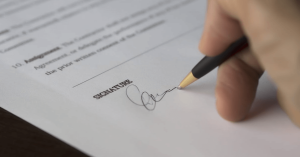Divorce or separation can be a complicated process, particularly when it comes to dividing up assets.
It is important for individuals considering divorce or separation to understand the legal rights and protections available in Australia.
As experienced family law specialists, our property settlement lawyers are here to provide a comprehensive overview of what you need to know about how to protect your assets from divorce in Australia.
Quick Summary
- Consider getting pre-nuptial agreements.
- Consider getting loan agreements in place from money that you have received from family members.
- Anything that is your name could be included in an asset pool that could be divided.
Consider Pre-Nuptial Agreements
It is important to consider entering into pre-nuptial or co-habitation agreements, that can provide legal protection for your assets during and potentially after divorce or separation.
These agreements usually occur before marriage and they can provide specific boundaries and expectations should the marriage end.
For existing relationships, a BFA could be considered. These agreements can specify how assets are to be divided between parties upon separation and can be tailored to each person’s specific needs, interests and goals.
Consider loan agreements
It is very common for people to obtain large sums of money or property from family members or parents who are trying to support their children to purchase a house of their own.
If this is done, it is always advisable to obtain a loan agreement from a lawyer who will be able to document the terms of the advanced money.
This is very important – as funds that are advanced throughout a relationship could be considered to be part of the matrimonial asset pool, and divided between the parties upon settlement.
Keep Finances Separate
Maintaining separate bank accounts and holding property in individual names can help in defining what assets are considered separate property.
It’s advisable for any inheritances or significant gifts to be kept separate to avoid them becoming mingled with marital assets.
This separation can simplify asset division in the event of a divorce.
Understand How Assets Are Valued and Divided
In Australia, the division of assets during a divorce considers joint and separate assets acquired before and during the marriage. Understanding the legal framework for valuing and dividing assets can help protect your financial interests.
Knowledge of these processes can inform decisions on asset management within the marriage.
Use Trusts Wisely
Trusts can effectively protect assets, but they must be established and managed correctly to ensure they serve their intended purpose without violating any laws.
Professional advice is essential to navigate the complexities of trust law in relation to family law, ensuring that trusts are not misused or perceived as a way to circumvent legal obligations.
Keep Accurate Records
Detailed and accurate financial records are invaluable in a divorce proceeding. They help in establishing the origins and ownership of assets, differentiating between personal and marital property.
Keeping comprehensive records can significantly influence the outcome of asset division by providing clear evidence of asset ownership and values.
Get Professional Advice
Consulting with family law experts and financial advisors is crucial for navigating the complexities of protecting assets in a divorce.
They can offer personalized advice and assist in drafting any legal documents required to safeguard your assets.
Their expertise can be invaluable in ensuring that your financial interests are well protected.
Review and Update Your Estate Plan
Regular reviews and updates of your will and estate plan are necessary, especially following significant life changes such as marriage or divorce.
These updates ensure that your estate plan reflects your current wishes and circumstances, providing additional protection for your assets and ensuring they are distributed according to your intentions.

How to Protect Assets from Divorce in Australia
In addition to understanding legal rights, it is important to seek professional financial advice.
It is important to note that the division of assets in a divorce or separation is a complex process that requires careful consideration.
A financial professional can provide guidance and expertise to give you a better understanding of the division process and how to maximise the value of your assets accordingly.
Divorce and separation can be difficult, but understanding legal rights surrounding asset protection can help increase your chances of a successful outcome. Justice Family Lawyers are experienced family law specialists and would be delighted to provide further guidance and assistance throughout the process.
Principal of Justice Family Lawyers, Hayder specialises in complex parenting and property family law matters. He is based in Sydney and holds a Bachelor of Law and Bachelor of Communications from UTS.







4 thoughts on “How to Protect Assets from Divorce in Australia”
If a husband wants a divorce and the family farm is tied up with the business is a partnership, company and trust with the guardian of the trust is the husband holding 5 shares and the wife 2 shares plus the wife has done everything from working on the farm, dealing with wool sales and organising the shearing teams, all the selling of produce eg: wool selling, grain selling, administration, 8 BAS/GST per year as the husband is quite illiterate she has a chronic disease plus an accident that she now has brain injuries and the husband refuses to take the wife to Dr’s appointments despite the wife’s illness he doesn’t lift a finger only by cutting wood and getting paid cash and he hides it and doesn’t buy anything for the house and is very mentally abusing the wife for years. What is your opinion on how assets should be divided taking into consideration about the past and ongoing problems between them both.
Hi Robyn it definitely seems like the family farm will be part of the asset pool that will be split between the two of you. I would reccomend you read this page as it goes thorough how assets are divided in a divorce: https://justicefamilylawyers.com.au/property-settlement/how-are-assets-divided-in-a-divorce-australia/
You should also seek personalised legal advice as your query is fairly detailed.
My son is in a long standing de facto relationship and has a child. He bought a house in his name only and wants to transfer the title to me. They have not separated or even discussed it although the relationship is not going particularly well. If they were to separate in the near or distant future, would his partner be able to make a claim on the house if I held the title?
Hi
Potentially. If it can be shown that this transaction was done to defeat a claim. Otherwise, it could be a gift.